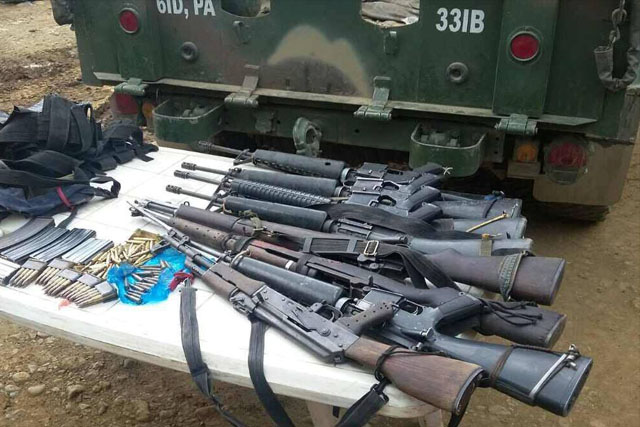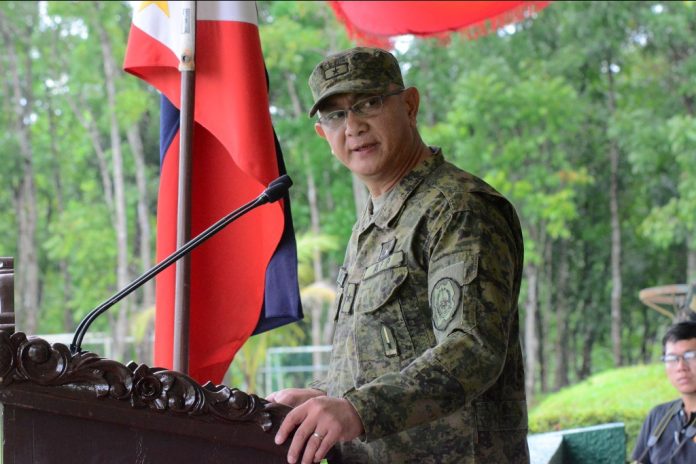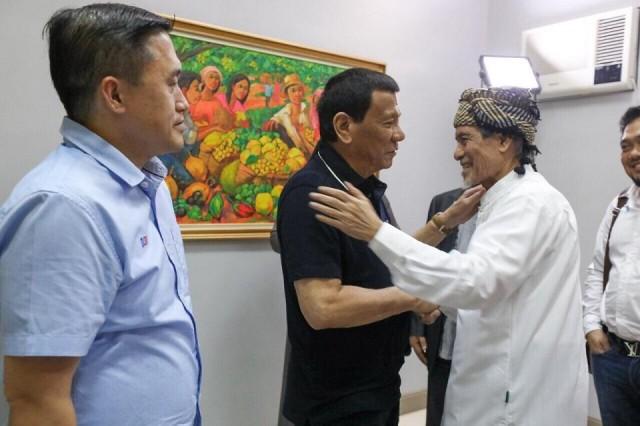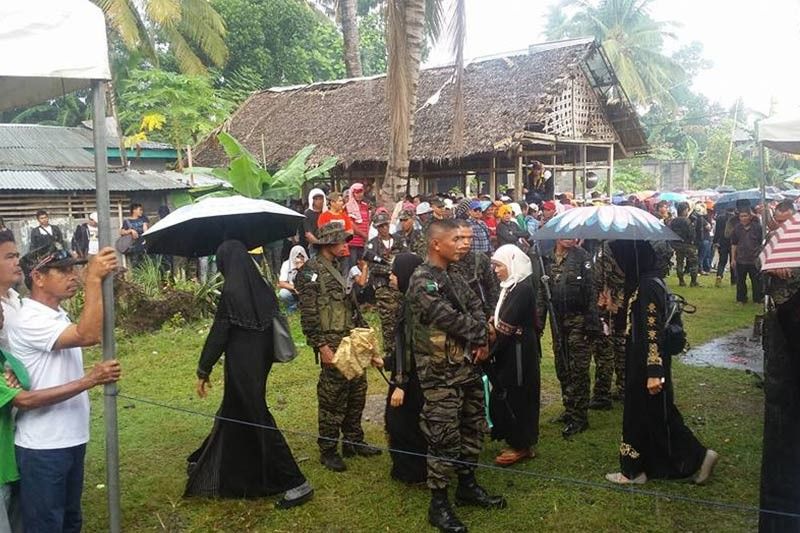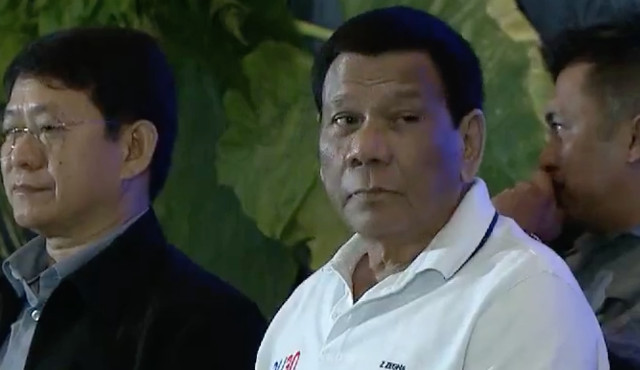United States (US) officials have asked President Duterte for a meeting on the Philippine armed forces' modernization program while Defense Secretary Delfin Lorenzana is in Russia to check out military equipment.
Duterte revealed yesterday that US State Secretary Mike Pompeo, Commerce Secretary Wilbur Ross, and Defense Secretary James Mathis have written a letter asking him to meet with them to talk about ways to strengthen the security and trade cooperation between Manila and Washington.
Related Stories
Russia ready to provide Philippine Navy with submarines
‘Procurement of Russian submarines unhealthy for Philippine-US alliance’
The officials also highlighted the track record of the US as a defense supplier and enumerated the capabilities of the equipment it supplied to the Philippines.
The President said he was willing to meet with the officials but challenged them to prove that they are acting in good faith.
He noted that some US lawmakers blocked the sale of firearms to the Philippine National Police because of human rights concerns.
"I would like to remind America all of them...how sure (are they) that I will be able to get what I bought?" Duterte said, noting that the purchase can be hampered by lawmakers who are against it.
Duterte also claimed that three of the six refurbished helicopters sold by the US to the Philippines had crashed.
"It's very important to me. I owe it to my soldier. We bought six helicopters. They said, they're refurbished, they were used by NATO (North Atlantic Treaty Organization). Apparently, they were overused," the President said.
"Three of the helicopters crashed, killing all my soldiers...now you are talking about procurement. Prove to me first that you are in utter good faith but I do not want to communicate with them," he added.
The letter, which was read by Duterte during the 12th anniversary of the Davao-based Armed Forces Eastern Mindanao Command, said the US-Philippine alliance is "an enduring partnership built on shared history and values"
"This special relationship will only grow stronger by increasing our dialogue and cooperation especially on security cooperation and trade. At the same time, we understand your country's need for certainly when considering the selecting technology for the defense and security of the Filipino people," the letter read.
"We are writing you to reaffirm this administration's strongest support for your effort to modernize the Armed Forces of the Philippines, and our commitment to continue to work with your Congress to support these strategic endeavors," it added.
The officials then told Duterte that the US is a "peerless supplier" of state of the art technology "with a proven track record." They cited the precision-guided munitions used during the operations in Marawi.
"We know, however, that our nations can do even more to integrate our economic and security concern. Especially we hope to partner in all the significant defense procurement of our mutual benefit including through the Lockheed Martin's F-16 multi-roll fighter platform, and your attack helicopter platform among other US systems," the officials said in their letter.
"We hope you share our view that our nation, selection of US partners for this future defense procurement, is mutually advantageous and strategically important way to strengthen and deepen the steadfast bonds," they added.
Duterte said he would debate with the officials to clarify things during the meeting, which he said would not be held in the US.
"There will never be a time I would go to America," he said.
Duterte discussed the letter while Philippine security officials led by Lorenzana are in Russia to shop for helicopters, submarines and other equipment. The visit also aims to explore ways to boost the defense cooperation between Manila and Moscow.
Duterte went on to enumerate a litany of atrocities during the Philippine-American War including the military operations in Balangiga that left thousands of Filipinos dead.
"It's hard to say we are friends. We are friends but remember we are friends because you made us a colony years ago...It was not a friendship agreed upon mutually satifying... It was a friendship imposed on us," the President said.
Duterte then reiterated his demand for the US to return the Balangiga bells, which were seized by American forces in 1901 as a war trophy.
"If the Balangiga bells are not returned, we don't have anything to talk about," he said.
"Just because it was 100 years so it is erased? And you still have the bells with you? The memory still haunts everybody here because it was taken with blood and lives," he added.
https://www.philstar.com/headlines/2018/08/23/1845242/us-officials-ask-meet-duterte-purchase-military-equipment
Duterte revealed yesterday that US State Secretary Mike Pompeo, Commerce Secretary Wilbur Ross, and Defense Secretary James Mathis have written a letter asking him to meet with them to talk about ways to strengthen the security and trade cooperation between Manila and Washington.
Related Stories
Russia ready to provide Philippine Navy with submarines
‘Procurement of Russian submarines unhealthy for Philippine-US alliance’
The officials also highlighted the track record of the US as a defense supplier and enumerated the capabilities of the equipment it supplied to the Philippines.
The President said he was willing to meet with the officials but challenged them to prove that they are acting in good faith.
He noted that some US lawmakers blocked the sale of firearms to the Philippine National Police because of human rights concerns.
"I would like to remind America all of them...how sure (are they) that I will be able to get what I bought?" Duterte said, noting that the purchase can be hampered by lawmakers who are against it.
Duterte also claimed that three of the six refurbished helicopters sold by the US to the Philippines had crashed.
"It's very important to me. I owe it to my soldier. We bought six helicopters. They said, they're refurbished, they were used by NATO (North Atlantic Treaty Organization). Apparently, they were overused," the President said.
"Three of the helicopters crashed, killing all my soldiers...now you are talking about procurement. Prove to me first that you are in utter good faith but I do not want to communicate with them," he added.
The letter, which was read by Duterte during the 12th anniversary of the Davao-based Armed Forces Eastern Mindanao Command, said the US-Philippine alliance is "an enduring partnership built on shared history and values"
"This special relationship will only grow stronger by increasing our dialogue and cooperation especially on security cooperation and trade. At the same time, we understand your country's need for certainly when considering the selecting technology for the defense and security of the Filipino people," the letter read.
"We are writing you to reaffirm this administration's strongest support for your effort to modernize the Armed Forces of the Philippines, and our commitment to continue to work with your Congress to support these strategic endeavors," it added.
The officials then told Duterte that the US is a "peerless supplier" of state of the art technology "with a proven track record." They cited the precision-guided munitions used during the operations in Marawi.
"We know, however, that our nations can do even more to integrate our economic and security concern. Especially we hope to partner in all the significant defense procurement of our mutual benefit including through the Lockheed Martin's F-16 multi-roll fighter platform, and your attack helicopter platform among other US systems," the officials said in their letter.
"We hope you share our view that our nation, selection of US partners for this future defense procurement, is mutually advantageous and strategically important way to strengthen and deepen the steadfast bonds," they added.
Duterte said he would debate with the officials to clarify things during the meeting, which he said would not be held in the US.
"There will never be a time I would go to America," he said.
Duterte discussed the letter while Philippine security officials led by Lorenzana are in Russia to shop for helicopters, submarines and other equipment. The visit also aims to explore ways to boost the defense cooperation between Manila and Moscow.
Duterte went on to enumerate a litany of atrocities during the Philippine-American War including the military operations in Balangiga that left thousands of Filipinos dead.
"It's hard to say we are friends. We are friends but remember we are friends because you made us a colony years ago...It was not a friendship agreed upon mutually satifying... It was a friendship imposed on us," the President said.
Duterte then reiterated his demand for the US to return the Balangiga bells, which were seized by American forces in 1901 as a war trophy.
"If the Balangiga bells are not returned, we don't have anything to talk about," he said.
"Just because it was 100 years so it is erased? And you still have the bells with you? The memory still haunts everybody here because it was taken with blood and lives," he added.
https://www.philstar.com/headlines/2018/08/23/1845242/us-officials-ask-meet-duterte-purchase-military-equipment


